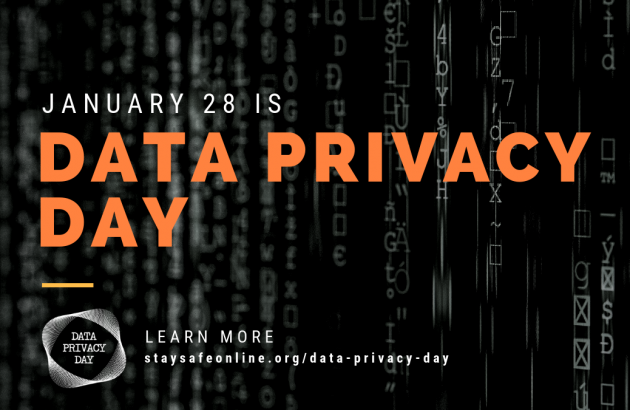Blog
Protect Your Online Data This Data Privacy Day
Do you know what access you're giving online companies to your personal information? This Data Privacy Day, take a look at the privacy settings of your online accounts and know how your personal information is being recorded and used.
Data Privacy Day, the signature event of the National Cyber Security Alliance (NCSA), "aims to inspire dialogue and empower individuals and companies to take action" about "how their personal information is being used, collected or shared in our digital society". Formally recognized by Senate Resolution 337 of the 114th Congress (2014), Data Privacy Day is a way for individuals, businesses, and communities "to learn about data privacy and the specific steps they can take to protect the privacy of information they possess about themselves and others" (§ 5).
So what can you do to protect your online data? NCSA provides information on online safety basics, identity theft, fraud, and cybercrime, securing key accounts and devices, and more. They even provide direct links to update your privacy settings on popular devices and online services, including Amazon, Google, LinkedIn, Uber, WhatsApp, and YouTube.
NCSA also encourages people to be advocates of online security and offers tips for how to promote online data security at home, at work, at school, and in your community.
Those interested in the legal aspects of data privacy may want to look at the Principles of the Law, Data Privacy project from the American Law Institute. The Tentative Draft was approved by ALI membership at the 2019 Annual Meeting. Broken into three chapters "Purpose, Scope, and Definition", "Data Privacy Principles", and "Accountability and Enforcement", this Principle "seeks to provide a set of best practices for entities that collect and control data concerning individuals and guidance for a variety of parties at the federal, state, and local levels" (Forward at xv). The ALI Advisor has more information regarding this project. Jenkins members have access to this approved Tentative Draft in print as well as on the member database HeinOnline.
Want more information on online security and the importance of protecting online data? Check out these materials available at Jenkins: Proskauer on Privacy: A Guide to Privacy and Data Security Law in the Information Age, Cybersecurity and Privacy in Business Transactions: Managing Data Risk in Deals (also available on the library's Bloomberg Law computers), PLI's Institute on Privacy and Data Security Law, and Privacy Law (available on Law Journal Press). For further research, Bloomberg Law, Lexis, and Westlaw, all available in the library, have pulled together practice area pages devoted to data privacy.
Other resources that focus on specific aspects of privacy may include information related to data security, including Financial Privacy Law Guide (available on the library's Cheetah computer), Health Care Privacy and Security (also available on the library's Westlaw computers), and Privacy in Employment Law (also available on the library's Bloomberg Law computers).
Looking for more privacy-related resources? Ask us!




